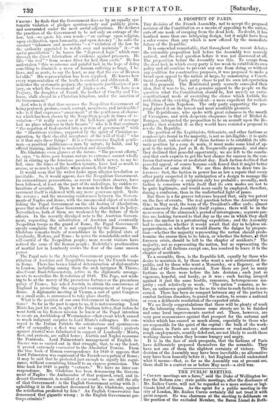A PROSPECT OF PARIS.
THE decisfon of the French Assembly, not to accept the proposed revision of the Constitution as a means of appealing to the nation, cuts off one mode of escaping from the dead lock. No doubt, it has baulked more than one intriguing design, but it might have been a safer course than any which is now offered by the immediate future of the Republic. It is somewhat remarkable, that throughout the recent debates the ostensible proposition laid before the Assembly was scarcely noticed, and the real question before it was not discussed at all. The proposition before the Assembly was this. To escape from the dead lock in which every party is too weak to establish its own policy and all combine to prevent any one from doing so without any coalition for constructive purposes, it was proposed to make a broad open appeal to the nation at large, by summoning a Consti- tuent Assembly. Each party chose to put its own interpretation on this proposal. The Ministerial party scarcely concealed their idea, that it was to be, not a genuine appeal to the people on the question what the Constitution should be, but merely an extra- constitutional mode of overriding the clause which forbids the reelection of the existinr, President—a mere expedient for reelect- ing Prince Louis Napoleon. The only party supporting the pro- posal placed it on the lowest and most assailable grounds.
The Republicans, who spoke with great calmness in the mouth of Cavaignac, and with desperate eloquence in that of Michel de Bourges, interpreted the proposition to be an assault upon the Re- public ; they resisted it as they would have resisted a proposal to revoke the Republic. The position of the Legitimists, Orleanists, and other factions or nondescripts found in the majority, is not so intelligible : it is quite evident that, unless either of those factions is to establish its ulti- mate position by a coup de main, it must make some kind of ap- peal to the nation, just as M. de Tocqueville proposed; and since they declined that peaceful opportunity, we are left to the conclu- sion that each expects to get the best chance for success in the con- fusion that must arise at no distant day. Each faction declined that peaceful appeal, of course because each feared that it might better the chance of some rival. We are thus driven to draw two in- ferences: first, the faction in power has so low a repute that every other party suspected it by anticipation of a design to manage the appeal dishonestly—a suspicion only too probable ; secondly, each faction is conscious within itself that its own modes are not to be quite legitimate, and would more easily be employed, therefore, during a confusion, than in the undisturbed light of peace.
But there is a far graver inference beyond that, only too patent on the face of events. The real question before the Assembly was this : in May next, the term of the President's office ends ; almost simultaneously the Assembly itself expires ; there will be in the mere course of the almanack a period of interregnum ; separate par- ties are looking forward to that day as the one in which they shall heave the anchor in a privateering expedition; and the Assembly had to consider, whether it would await that day in helpless un- preparedness, or whether it would disarm the danger by prepara- tion—whether the majority representing the nation should prede- termine the course then to be taken, or whether the future, at that foreseen crisis, should be left to the chapter of accidents ? The majority, not as representing the nation, but as representing the aggregate of all factions except one, has resolved to leave it to the chapter of accidents.
To a scramble, then, is the Republic left, equally by those who desire to maintain it, by those who want a new aristoeratized Re- public, and by those who want a Monarchy, or a Regency, or the old line of the Bourbons restored. Now there are just as many factions as there were before the late decision ; each just as vigorous, hopeful, and hardy, as it was ; each having arrayed against it just the same hostile, rancorous, heterogeneous ma- jority ; each relatively as weak. "The nation" remains, as be- fore, an unknown quantity so far as its value to each faction is con- cerned. There has been no compact between any of the parties to combat factious disorders, to guard the nation, to secure a national or even a deliberate resolution of the expected crisis. We see lively congratulations that there will be plenty of work for the labouring classes, because some streets are to be finished and some local improvements carried out. These, however, are very poor reassurances against that prospect for the autumn and winter which has caused so much alarm especially to those who are responsible for the quiet of the capital. : the bulk of the work- ing classes in Paris are not stone-masons or road-makers ; and rough employments, scantily doled out, are not likely to sooth those working classes when they become hungry and angry.
It is in the face of such prospects, that the factions of Paris have deliberately prepared themselves for the scramble. They have not one of them the slightest certainty of victory. The decision of the Assembly, may have been inevitable ; no alternative may have been honestly before it but England should understand what it means—that, so far as the Assembly can at present see, there shall be a contest on or before May next—a civil war.


























 Previous page
Previous page